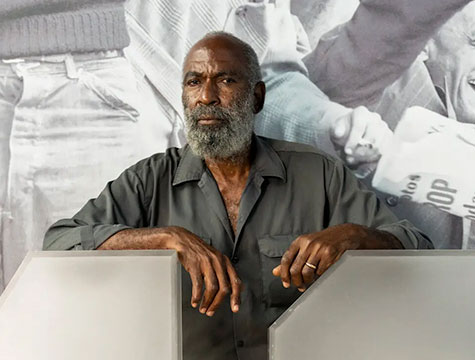
News
The Jackie Robinson Museum Is About a Lot More Than Baseball
Robinson accomplished a great deal on the field, but a museum celebrating his life puts as much focus on his civil rights work.
READ MOREPlan your visit or become a member today! Get your tickets for January Programs & Events!
Growing up in Pasadena, California, Jackie Robinson looked up to his older brother Mack, who was blazing trails in track and field long before Jackie became a household name. Mack Robinson was born in Cairo, Georgia, in 1914, five years before Jackie. While Mack participated in a wide range of track events over his career, he was chiefly a sprinter, and his skill in the 200 meters earned him honors at Pasadena Junior College, the University of Oregon, and perhaps most famously, the 1936 Olympics.
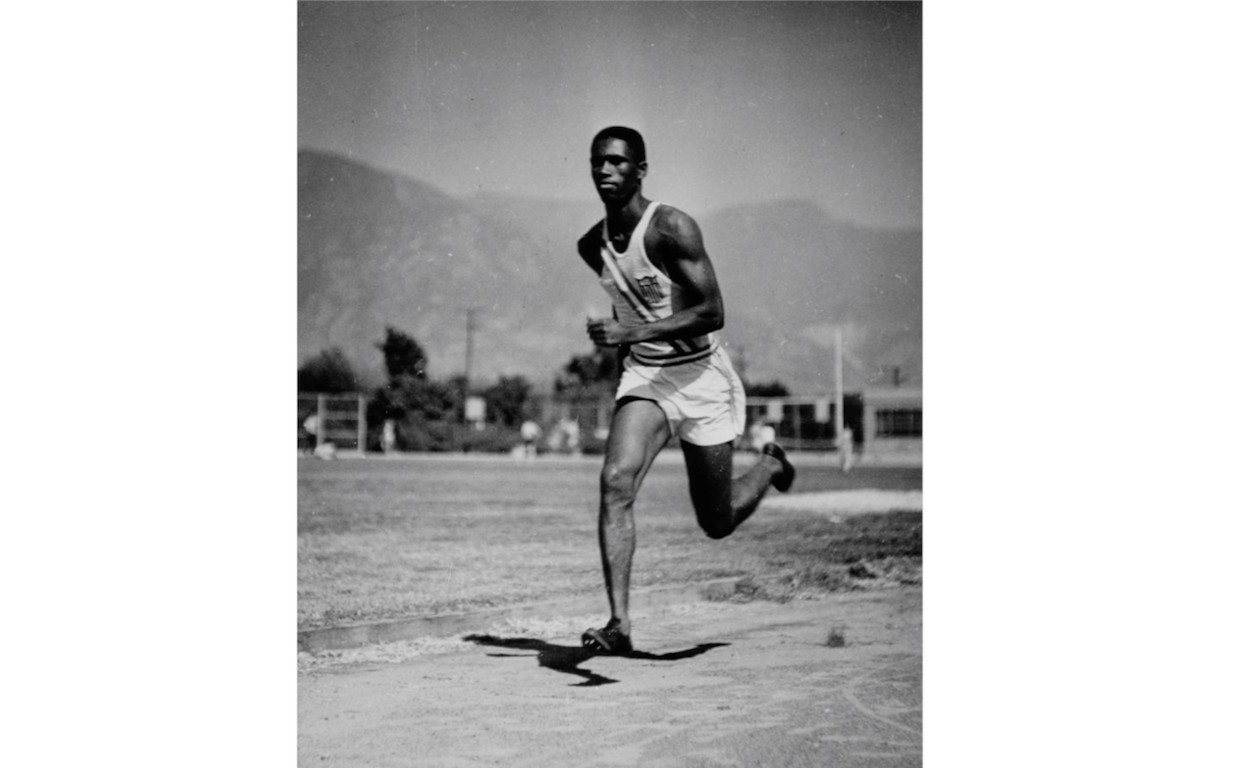
Mack Robinson training for the Berlin Olympics, 1936
The 1936 Summer Olympics, the planning for which began in 1931, were held in Berlin in the heart of Hitler’s Germany. The completion of the Nazi takeover in 1933 transformed the planned games into a celebration of Aryan supremacy, with Hitler himself opening the festivities to roaring applause. Like many state-sponsored emblems of Nazi culture, the Olympics were an opportunity for the country to showcase the prowess of German athletes, and by extension, the physical might of a militarily resurgent nation.
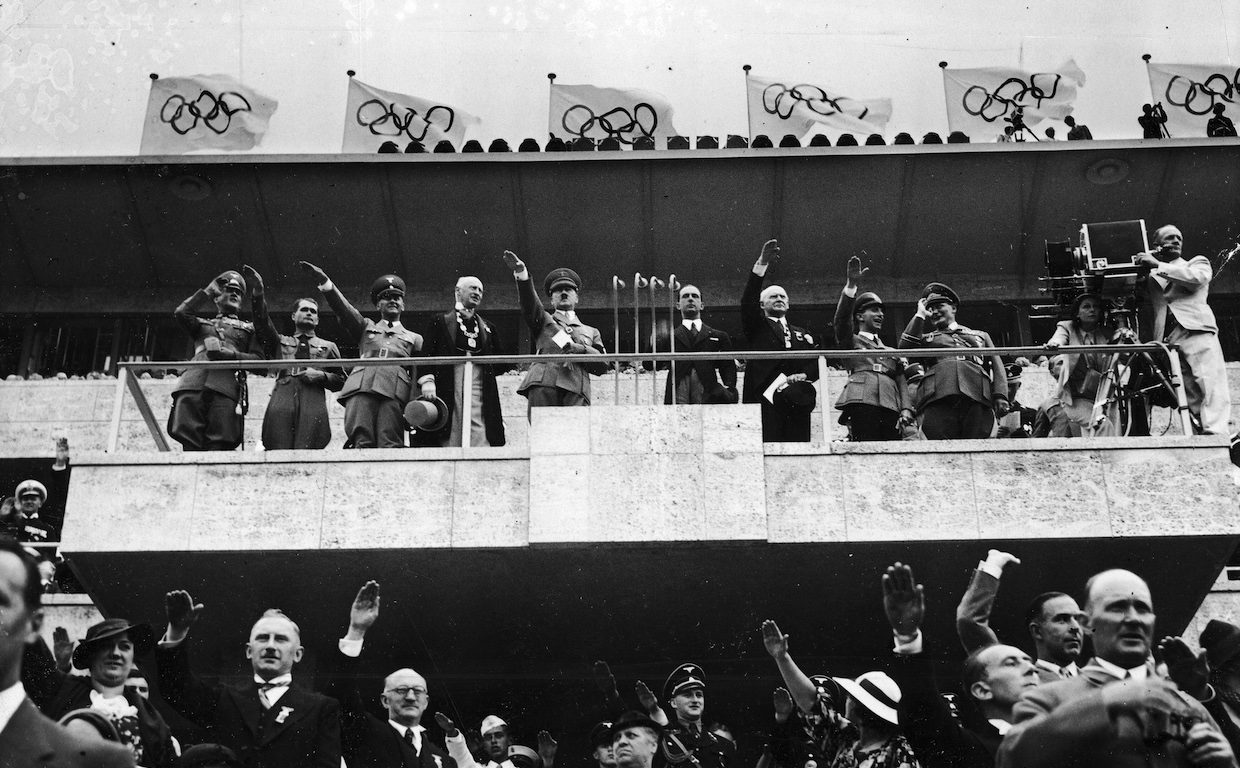
Adolf Hitler and other officials salute spectators at the Olympiastadion in Berlin, Wikimedia Commons.
For Mack Robinson, even getting to the Olympics was a challenge. Lacking the funds to make the trip to New York City for the Olympic Trials at Randall’s Island, a group of local Pasadena businessmen raised $150 for his train fare. At the trials he had no coach and he qualified for Berlin wearing a pair of threadbare spikes he had worn during the previous college track season.
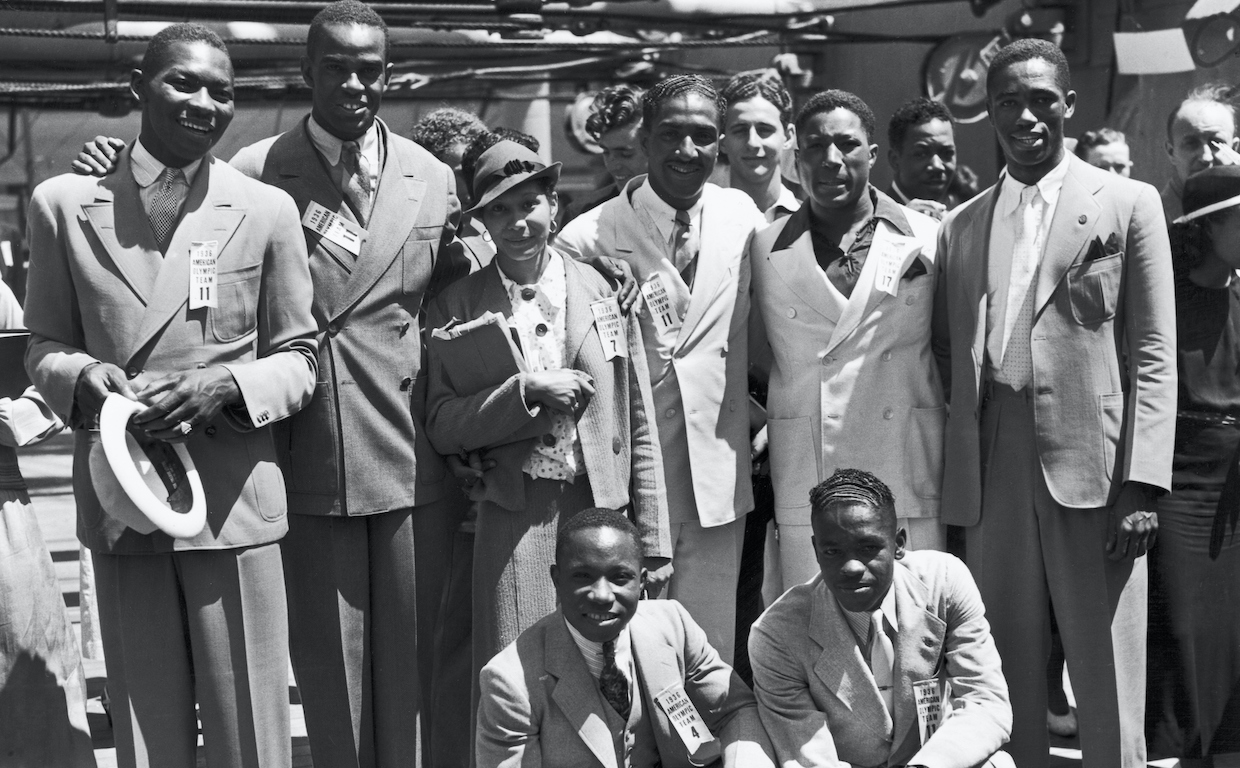
Black Olympians aboard the USS Lusitania, on its voyage to the games in Berlin, June 15, 1936. (l to r) Dave Albritton, Cornelius Johnson, Tidye Pickett, John Terry, Ralph Metcalfe, Jim Clark, John Brooks, Matthew (Mack) Robinson. Bettmann Archive, Getty Images.
It was into this crucible that Robinson and seventeen other African American Olympians were thrown. Despite the racist attitudes of both the German and American press, Mack and his compatriots excelled, winning 14 medals, a quarter of the United States’ 57 medals at the games. Robinson competed in the 200-meter dash, his only event. Robinson won all three heats in which he competed. In the third, he finished in 21.1 seconds, tying an Olympic record. In the final, Mack faced Jesse Owens, who was already renowned as “the world’s fastest man.” Still wearing the same battered cleats, he finished second behind Owens, crossing the line four-tenths of a second after the gold medalist.
Mack Robinson finishes four-tenths of a second behind Jesse Owens, winning the silver medal, in the 200m final at the 1936 Olympics. ABC News.
Other Black athletes found success, as well. Sprinters John Woodruff and Ralph Metcalfe both won gold in the 800 meters and the 4×100 relay respectively. Cornelius Johnson and David Albritton took gold and silver in the high jump, another high-profile event. For Hitler and the Nazi Party, these victories were a humiliation. Although Germany found success on the medal table, losing to Black athletes specifically was a blow to the nation’s white supremacist ideals. Even so, the logics of racial superiority are more durable than any singular athletic event. According to Albert Speer, a high-ranking Nazi administrator (and later Nuremberg detainee), the victories of Owens and the other athletes compelled Hitler’s declaration that Black athletes should be banned from future competitions, due to their “natural” athletic ability.
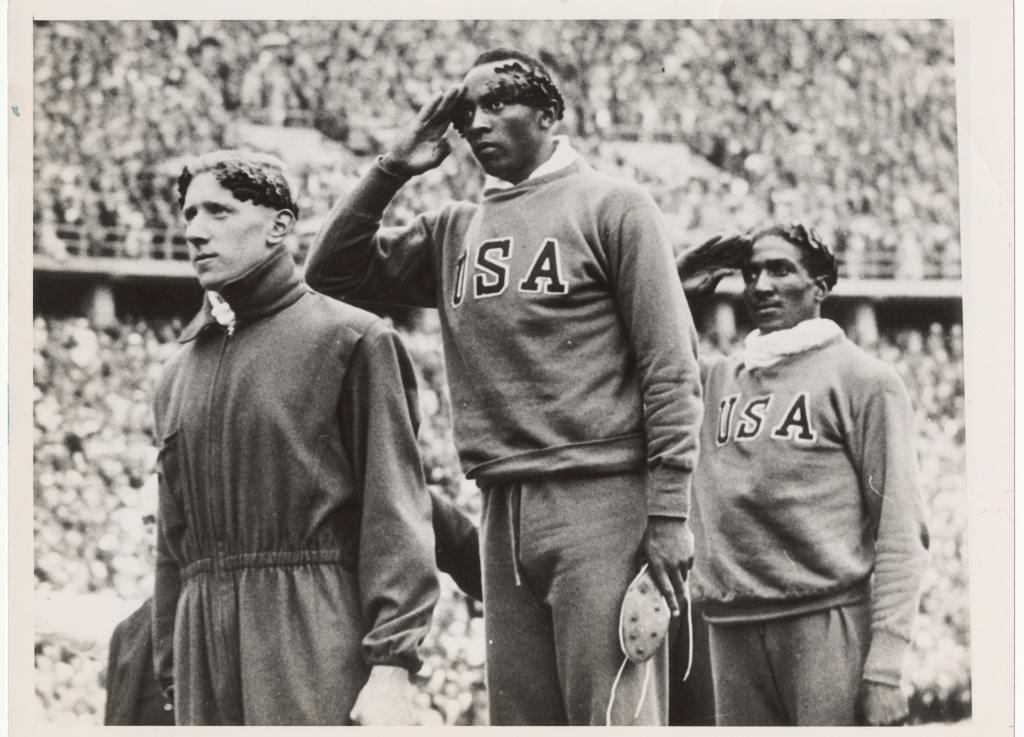
Jesse Owens (center) and Ralph Metcalfe (right) stand on the podium after taking gold and silver in the 100 meters at the 1936 Berlin Olympics. Cornell University Special Collections.
The Black Olympians’ return home was likewise reprehensible. None of the eighteen athletes were invited to the White House; President Franklin Roosevelt only welcomed the white Olympians. Even Jesse Owens, who was invited to participate in a celebratory ticker-tape parade down Fifth Avenue in New York City and a dinner at the Waldorf Astoria Hotel in his honor, was forced to ride the freight elevator to his own reception.
Outside of Owens, the laurels heaped upon the Black athletes in Berlin did not translate to personal success once they returned home. Mack returned to Pasadena to find only three people came to greet him at the train station. No ticker-tape parades, long-term coaching jobs, or professional athletic success awaited him. Although he attended the University of Oregon, where he continued to excel in track, he left to support his family before he could complete his degree. When he left the university, he returned to Pasadena and became a street cleaner, often wearing his Olympic jacket as he walked from block to block.
Mack Robinson discusses the importance and meaning of his silver medal in an interview with William Miles, 1986. Washington University Special Collections Library Film and Media Archive.
During his lifetime, Mack Robinson’s contributions on the international stage and to the athletic culture of the United States went largely unacknowledged in his hometown. Moreover, the racist treatment that the Robinsons encountered as children continued well into Mack’s adulthood. After Pasadena was forced to desegregate its public pools, Mack and other Black employees were fired from their municipal jobs in retaliation. For the rest of his life, Mack agitated for change in his city. In addition to standing up for the rights of underprivileged youth, he consistently criticized the city for refusing to acknowledge or memorialize his brother Jackie’s accomplishments. Only in 1997, fewer than three years before Mack’s death, did Pasadena unveil a memorial to the brothers across the street from City Hall.
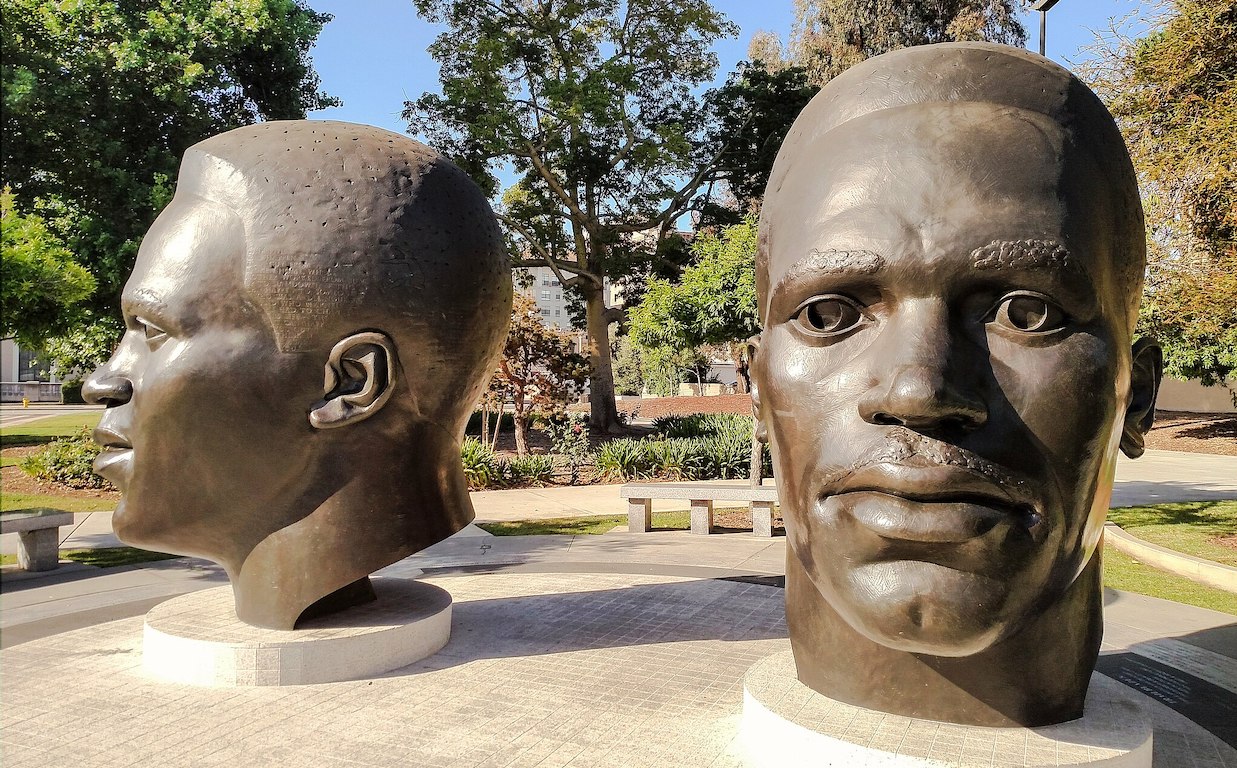
Jackie (left) and Mack Robinson (right) are rendered in bronze outside of Pasadena’s city hall. Public Domain.
After striking a cultural blow against Nazism that resonated around the world, Mack returned to a country that exploited and mistreated him, as it had done before his Olympic triumph. Though he remained disappointed in the slow progress occurring in Pasadena and around the country, he grew into a respected civic leader, standing up for his community when others would not. Far beyond merely being an inspiration for his younger brother Jackie, Mack stood resolute as he demanded a better Pasadena, and a better world.

News
Robinson accomplished a great deal on the field, but a museum celebrating his life puts as much focus on his civil rights work.
READ MORE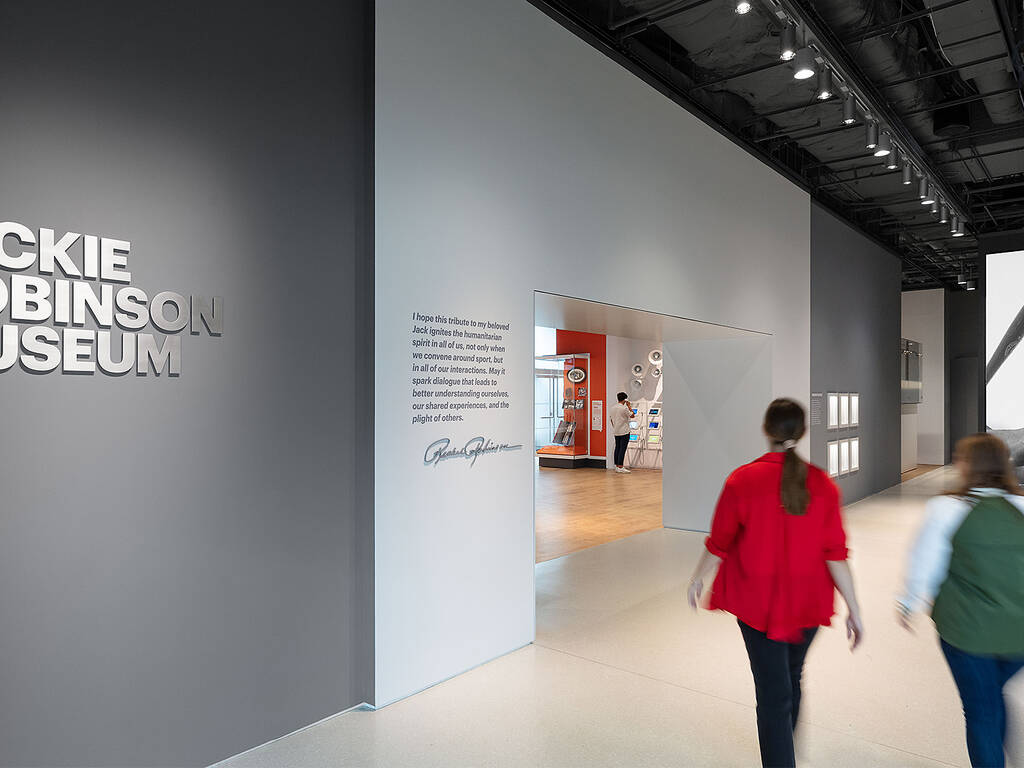
News
Visitors will also get to explore an immersive experience “to better understand the racism and prejudice Robinson encountered beyond the baseball field, as well as stories of his lasting influence on sports, politics and entertainment today.”
READ MORE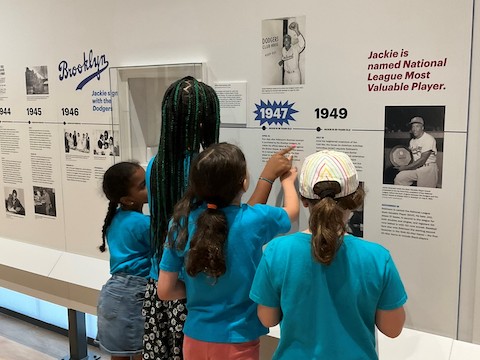
Programs & Events
Get the scoop on new programs and resources for teachers, students, and families!
READ MORE